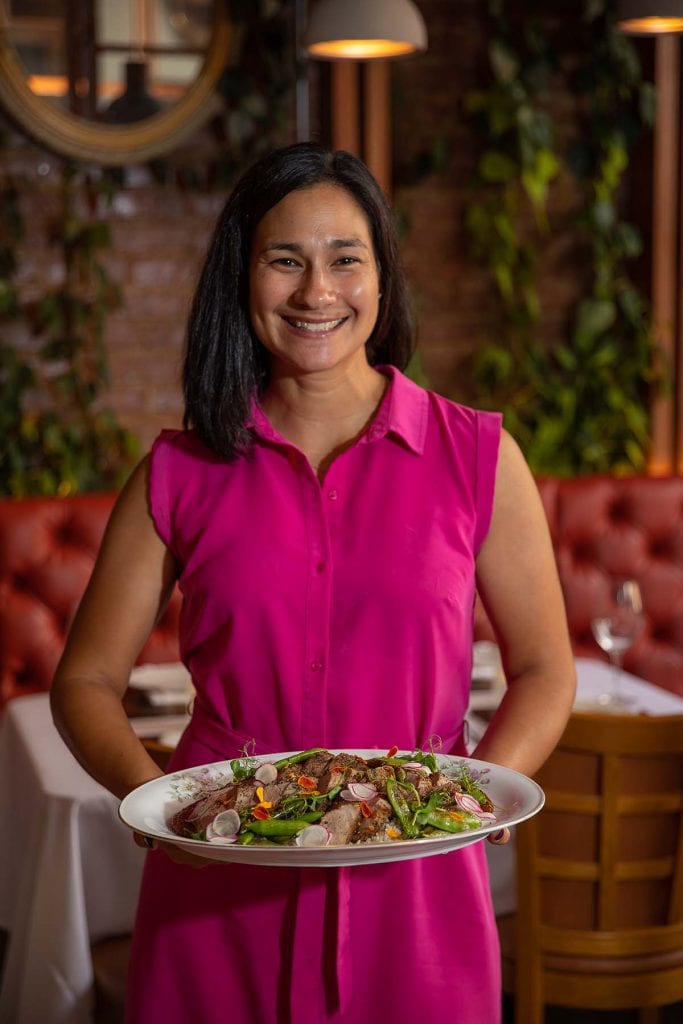Go northeast from Tulsa’s skyscrapers. Half an hour or so later, leave the interstate and head out on a winding country road. Go through the one-stoplight town of Adair, and then it’s nothing but weathered tin barns and low-slung houses.
Down an even narrower side road and you’re on Angie Faughtenberry’s 413 Farm.
Big, curious dogs surround you. (“They’re working dogs,” Faughtenberry says. “They do guard duty in teams of two. Lots of raccoons and foxes.”) You bravely push past them (provided she’s with you to call them off), go up a rocky forested hill and sit down. While not far from the highway, you’re in an entirely different world.
“Just be still. Here they come,” Faughtenberry says.
Then the pigs amble in. Sometimes they stop and placidly graze or root around the base of trees. One scratches his head against a tree stump with what you’d swear is a big grin.
“I come here every day,” Faughtenberry says. “Oh I love it – watching them.”
Are they happy?
“Oh, yeah. They get to live out all their pigness,” she says. “Soon the nuts will drop from the trees and they’ll get to eat all that.”
Faughtenberry grew up in a middle-class suburb north of Dallas. She married a hydraulic engineer named Jonathan, followed him from job to job, and had six boys and a girl.
She had loved the slow pace of rural life since childhood summers spent on her uncle’s farm, so she and her husband found a place where he could get a job in a city (Tulsa) and they could live on a farm within commuting distance.
She met famed eco-farmer Joel Salatin at a benefit and spent several weeks learning from him.
“And I love learning from other farmers; my neighbors are great assets and great friends,” Faughtenberry says.
She has formed lifelong friendships with several Tulsa-area chefs, especially Kevin Snell at Amelia’s, and many restaurants feature her products.
“I went to culinary school,” Faughtenberry says, “and I help them cook at farm dinners. I combine my love of food and farming.”
To hear Faughtenberry tell it, farming is simple.
“We started with chickens, then moved to pigs and cows,” she says. “Things went smooth. When you get the hang of it, it’s easy.”
However, her husband, who does his full share of work on the farm, says: “She told you it’s easy? Well, it’s tough, and there’s a lot of sweating going on. You’re always carrying water, carrying those 50 pound bags of feed, and in summer it gets to be 102 degrees.
“And then there’s fence posts to be dug, and maybe 500 bales of hay to be loaded. Boy, do you get dirty. Hey, Angie, you told him it’s easy?”
With a fond smile, she replies, “He’s a city boy.”
Then straight from the pages of Huckleberry Finn, two brothers wearing blue overalls run past.
“Mom, we’re going fishing in the pond,” one yells.
“No, you’re not; that pond is full of snakes,” Faughtenberry shouts.
But, as you begin to drive back toward Tulsa, you look back and there are the kids fishing.
“Oh they’re my free-range kids,” Faughtenberry says. “They run free like pigs.”
Guests are welcome at 413 Farm, provided you arrange a visit.
[cooked-recipe id=”65935″]























